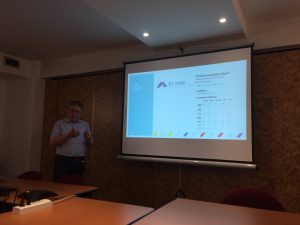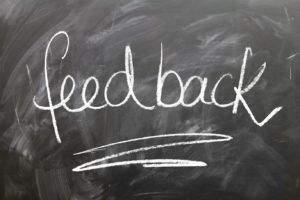 Inclusive Publishing has embarked on a series of interviews with industry leaders and their approach to accessibility. George Kerscher began his IT innovations in 1987 and coined the term “print disabled”. He is dedicated to developing technologies that make information not only accessible, but also fully functional in the hands of persons who are blind or who have a print disability. He believes properly designed digitally published materials and web pages can make information accessible to all people. George is an advocate for semantically rich content which can be used effectively by everybody.
Inclusive Publishing has embarked on a series of interviews with industry leaders and their approach to accessibility. George Kerscher began his IT innovations in 1987 and coined the term “print disabled”. He is dedicated to developing technologies that make information not only accessible, but also fully functional in the hands of persons who are blind or who have a print disability. He believes properly designed digitally published materials and web pages can make information accessible to all people. George is an advocate for semantically rich content which can be used effectively by everybody.
As Chief Innovations Officer of the DAISY Consortium, Senior Advisor, Global Literacy to Benetech, and member of Publishing Groups in the W3C, Kerscher is a recognized international leader in document access. In addition, he chairs the DAISY/NISO Standards committee and the Steering Council of the Web Accessibility Initiative (WAI), and also serves on the Advisory Board of the Institute of Museum and Library Services (IMLS).
I ask all of my staff to use a screen reader, put a towel over their screen and send me an email! This involves them getting to their desktop, launching an app or email program, writing that email and then sending it. Suddenly it all clicks!
Accessibility in publishing has improved significantly in the last 30 years, can you give us a practical example of what it was like before?
When I first got involved in accessible publishing there was no accessibility within mainstream published printed content. Not until initiatives that utilize chop & scan, source file conversions and recordings for libraries for the blind did progress begin concerning the accessibility of a wider range of printed content. Before this time, it was only libraries serving the blind that selected key publications to be made available. People just wanted more and a wider range of materials to be available. However, it was still sitting in the hands of specialist organizations that were completely separate from those who published the information; that had to change; it had to integrate with the mainstream flow of published materials.
Significant change for digital publishing materials really began in 2000 although this was hampered by DRM preventing technology working with assistive materials. Jim Fruchterman and I wrote the article The Soundproof Book in 2002 which really helped raise awareness of these issues. The DRM problem was eventually solved as it became accepted that content on screen could be exposed to assistive technology and the accessibility of the content could be evaluated.
With the introduction of the iPad and Steve Jobs’ commitment to EPUB we witnessed a turning point for accessibility in digital content. Features such as VoiceOver meant that much more material could be accessed on iBooks.
With the arrival of EPUB 3 in 2011, DAISY endorsed it as their file format of choice. They halted development of the DAISY standard and began the transition to EPUB. Together with reading system evaluations, which still take place today, EPUB provides the best option for accessibility in the mainstream.
What has been the most impactful change in accessibility to help bring us here?
The turning point for me was when publishing and technology accepted that assistive technology cannot be blocked. This was the game changer. You cannot stop people from accessing content.
Are there any questions you regularly encounter which you wish people knew by now?
People often say that they don’t see where EPUB is used as they don’t realise that ibooks, Google, Barnes & Noble, Kobo, Apple etc. are all using EPUB as their primary format. It’s behind the scenes. This can be frustrating and publishers still provide pdfs and readers accept pdfs without realising that the user experience from re-flowable EPUB is far superior. We need to make that transition – we need to make sure readers are requesting born accessible EPUBs and that publishers are offering them. I think we are in an in-between phase at the moment – after all, pdf has been around for 25 years. But EPUB is based on modern web technology and this is where all of the accessibility advances are being made.
What would be the single most important piece of advice you could give to a publishing colleague who is new to accessibility?
Use Ace by DAISY! That’s clearly the first thing they need to do! They should also try to understand how assistive technology is used. I ask all of my staff to use a screen reader, put a towel over their screen and send me an email! This involves them getting to their desktop, launching an app or email program, writing that email and then sending it. Suddenly it all clicks! Navigating through their computer and apps has to be fast and efficient and in their visual world it is easy to take in an entire panorama. In an audio space everything is sequential and your screen reader presents one piece of information at a time until you yourself have built a mental model. The same thing applies to the reading experience and when everything is laid out correctly then content becomes a joy to read.
What do you think will be the biggest game changer for inclusive publishing in the next couple of years?
I think that the further adoption of EPUB by even the small publishers and the inclusion of accessibility metadata within purchasing systems will be the next game changer. A good accessibility rating and conformance to accessibility standards is going to become a pre-requisite in the education space and useful purchasing choices will be made on accessibility criteria.
What do you think is the biggest challenge for publishers, and how might they overcome it?
I think that publishers are finding the production of accessible mainstream content for text only content fairly straightforward. The challenge will come in adding more interactivity in education materials. Trying to present the essence of a visualisation is going to be difficult and experts will have to write meaningful summaries for everyone working with that visualisation but especially if the student is disabled. The supplemental information provided with visualisations is crucial to a contextual understanding of the interactive material.
Do you have any final thoughts on accessibility or inclusive publishing practices you would like to share?
I have a concern about university presses who are still very ingrained within the print paradigm. I’d like to see a move towards EPUB and online publishing but the “publish or perish” ethos is still adhered to within this space. Journal publishers may be able to lead the way on this as the data that is included in their articles appears online but convincing academics that a move towards digital publishing is essential is going to be difficult.
I really feel that we’ve passed the “tipping point” and that the publishing industry understands the necessity of accessibility. They understand that they have a commitment to making information available to the public. The route of both words, publishing and public is the same after all!
Our thanks to George for his time.





